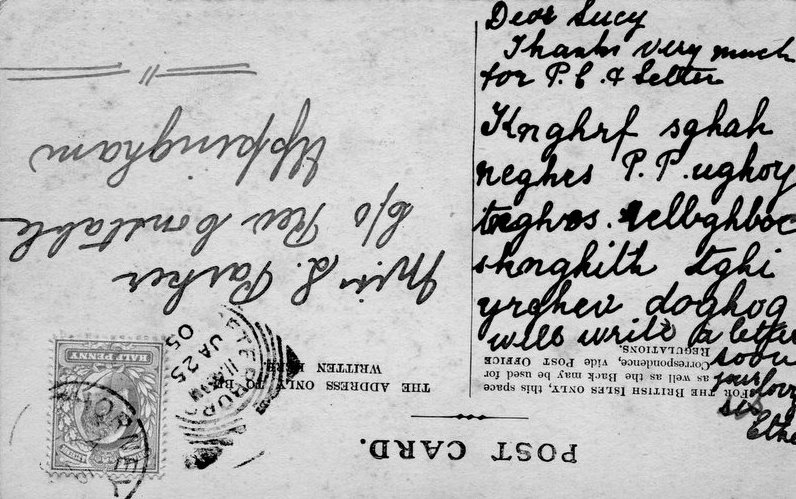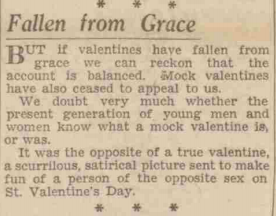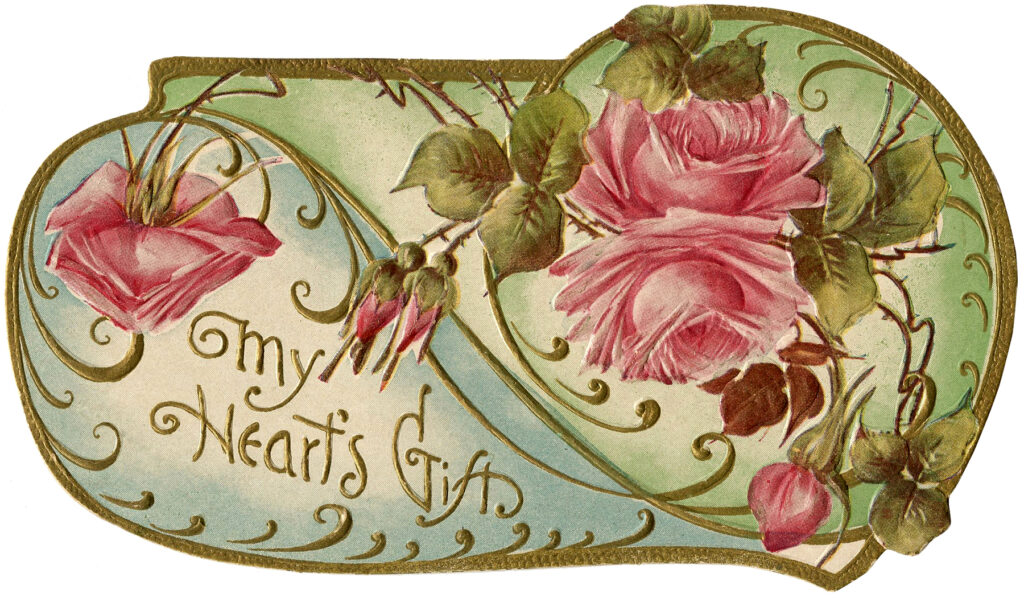
Sweet And Sour Valentines
Oh, that all days were as this day
Most of the card was written in a code. The postcard reminds me it was not only couples that exchanged cards in the Victorian and Edwardian period. While some ‘men were known to spend up to a month’s wages on buying the most elaborate cards to demonstrate their love,’ it would appear there was a card for every possible feeling. i
Sweet, Loving valentines
The industrialisation of Britain in the early 19th-century brought with it rapid advances in printing and manufacturing technologies. It became much cheaper to mass-produce Valentine’s cards. It is estimated that by the mid-1820s, some 200,000 Valentines were circulated in London alone. The introduction of the Uniform Penny Post in 1840 bolstered the popularity of Valentine’s cards yet further. The cards could be lacy, silvered, embossed, scented, and cushioned, with cherubs, birds, and flower garlands, but Victorian printers and stationers also sold a selection of cards of a very different kind. ii
Sour, mean Valentines
People were also encouraged to buy mocking Valentines. Sometimes Victorian men sent derisive cards, featuring taunts about baldness and alcoholism, for example. iii However, I suspect women were the main perpetrators of the mean Valentine. For example, this one has a particular feminine undertone:
Miss Nosey
On account of your talk of others’ affairs
At most dances you sit warming the chairs.
Because of the care with which you attend
To all others’ business you haven’t a friend. iv
Like internet trolling, women often bore the brunt of abusive, shaming and sometimes vicious Valentines when they were home, alone and vulnerable. Flora Thompson, in her fictionalised memoir, Lark Rise to Candleford, recalls receiving a crudely drawn printed caricature of a postmistress (reflecting her occupation), the valentine included a cruel verse and personalised insulting inscription commenting on her appearance. It was promptly thrown into the fire and kept a secret. v
As a species we are wired to cooperate, but if anonymous insulting and shaming is possible without repercussion then maybe some people will stoop to it. vi Current research indicates it is men with high self-esteem who have persistent antisocial or sadistic behaviour, impaired empathy, and disinhibited, egotistical traits that are most likely to troll on the internet. vii

It is clear the poisonous valentines fell out of favour. Had they become socially unacceptable? I hope that internet trolling will be successfully challenged with ‘outward indifference’. viii The demise of the sour and poisonous Valentines can give us hope that trolling too will become a thing of the past. ix

i Beattie, S., 2014. Victorian Valentines • V&A Blog. V&A Blog. https://www.vam.ac.uk/blog/caring-for-our-collections/victorian-valentines [Accessed 9 February 2021].
ii Pollen, A., 2014. Love letters and hate mail: Victorian vinegar valentines. https://brightonmuseums.org.uk/discover/2014/09/08/love-letters-and-hate-mail-victorian-vinegar-valentines/ [Accessed 29 January 2021].
iii Ibid.
iv HistoryExtra. 2020. A history of Valentine’s Day celebrations—from fertility festivals to the first cards. https://www.historyextra.com/period/modern/when-was-valentines-day-first-celebrated-cards-history-saint-valentine/ [Accessed 29 January 2021].
v Pollen, A., 2014. Love letters and hate mail: Victorian vinegar valentines. https://brightonmuseums.org.uk/discover/2014/09/08/love-letters-and-hate-mail-victorian-vinegar-valentines/ [Accessed 29 January 2021].
vi O’Connor, K., 2017. ‘Vinegar Valentines’ thankfully out of vogue. https://www.houstonchronicle.com/life/article/Vinegar-Valentines-thankfully-out-of-vogue-10928678.php [Accessed 29 January 2021].
vii March, E., 2020. New research shows trolls don’t just enjoy hurting others, they also feel good about themselves. [online] The Conversation. https://theconversation.com/new-research-shows-trolls-dont-just-enjoy-hurting-others-they-also-feel-good-about-themselves-145931 [Accessed 29 January 2021].
viii Ibid.
ix A troll is Internet slang for a person who intentionally tries to instigate conflict, hostility, or arguments in an online social community. GCFGlobal.org. n.d. The Now: What is Trolling? https://edu.gcfglobal.org/en/thenow/what-is-trolling/1/ [Accessed 11 February 2021]. Trolling is generally about provoking a reaction, whether that’s because trolls enjoy seeing people hurt or because they want to be amplified. Bbc.co.uk. 2021. Why do people troll and what can you do about it? https://www.bbc.co.uk/bitesize/articles/zfmkrj6#:~:text=Dr%20Griffiths%20sees%20trolling%20as,they%20want%20to%20be%20amplified.%E2%80%9D [Accessed 11 February 2021].
